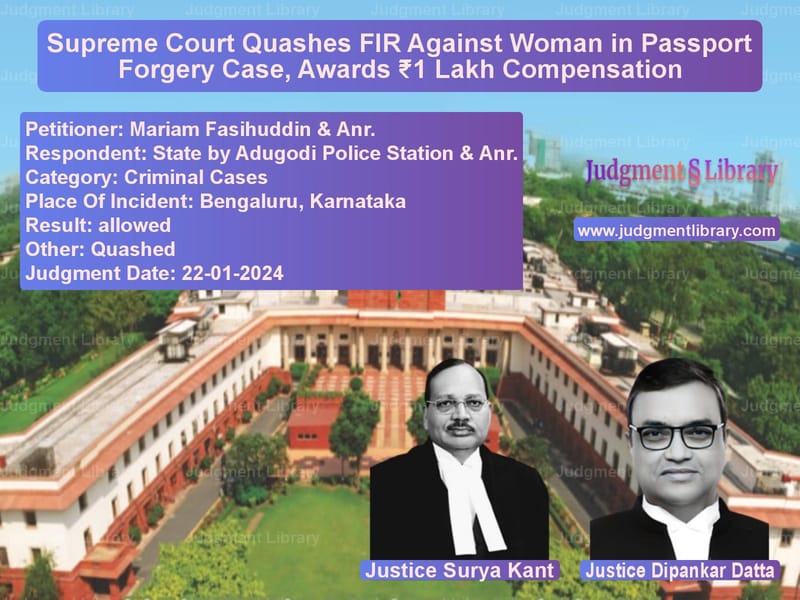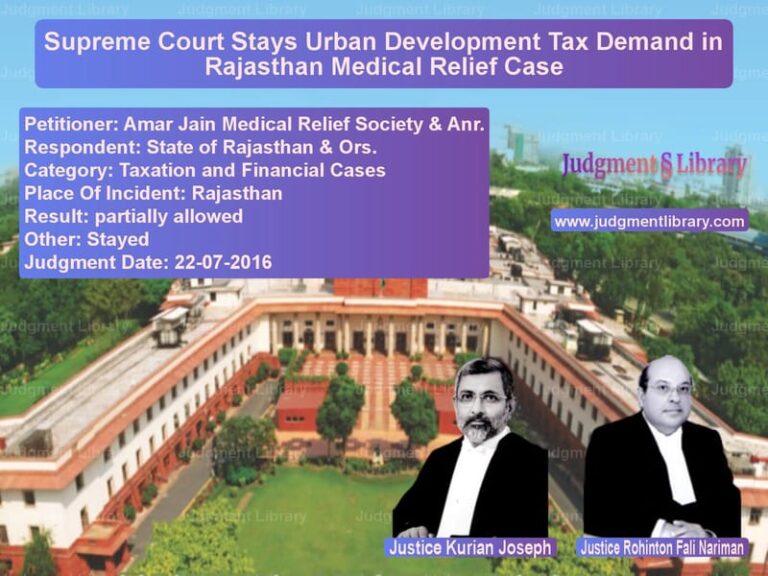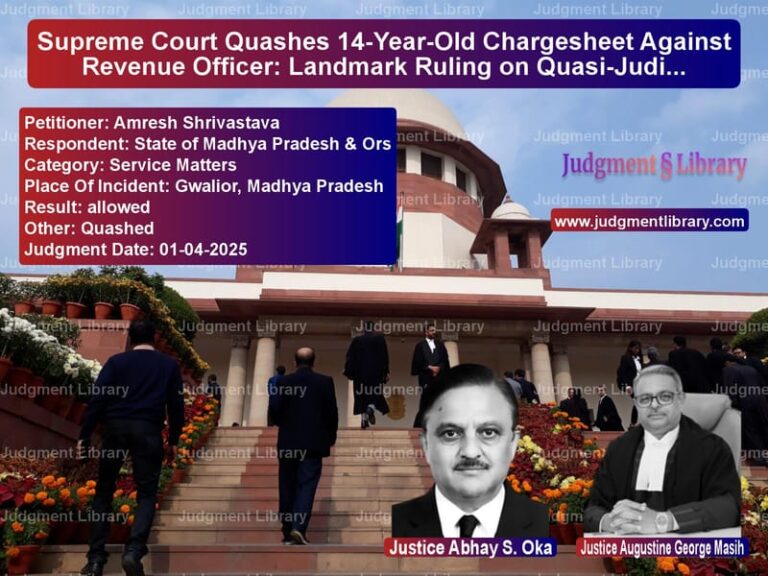Supreme Court Quashes FIR Against Woman in Passport Forgery Case, Awards ₹1 Lakh Compensation
The Supreme Court of India, in the case of Mariam Fasihuddin & Anr. vs. State by Adugodi Police Station & Anr., has quashed the FIR filed against the petitioner, which accused her of forgery in obtaining a passport for her minor child. The Court found that the case was a result of a marital dispute and that the allegations were baseless. The ruling sets an important precedent in cases involving alleged forgery in passport applications and the misuse of criminal law in family disputes.
Background of the Case
The case revolves around a marital dispute between the appellant, Mariam Fasihuddin, and her husband, Respondent No. 2. The couple got married in Bengaluru on August 2, 2007. The husband, a software professional, was based in the United Kingdom and had assured his wife that they would reside together in London after marriage. However, the wife alleged that she was confined at her sister-in-law’s residence and later abandoned by her husband.
After returning to India, she gave birth to a son on June 2, 2008. She alleged that her husband and his family provided no financial assistance. In January 2009, she applied for a passport for her minor child, allegedly with the consent of her husband. The passport was issued, and a sponsorship letter was provided by her brother-in-law, Dr. M.K. Shariff, for their relocation to the United Kingdom.
Criminal Proceedings Against the Wife
In April 2010, the wife filed a domestic violence complaint against her husband under Sections 346, 498A, and 506 of the Indian Penal Code (IPC). Shortly after, in May 2010, her husband lodged an FIR against her, alleging that she had forged his signature on their son’s passport application. The case was registered under Sections 420, 468, and 471 read with Section 34 IPC.
Following the police investigation:
- A chargesheet was filed against the wife and a travel agent.
- The charges under Sections 468 and 471 IPC were dropped.
- The wife was charged only under Section 420 IPC.
The wife moved the High Court seeking to quash the FIR, but her plea was rejected. She then approached the Supreme Court.
Key Legal Issues
- Whether the wife had committed an act of forgery in obtaining a passport for her child.
- Whether the case was a misuse of criminal law in a marital dispute.
- Whether the continuation of proceedings would serve the interests of justice.
Petitioner’s Arguments
The petitioner contended:
- The FIR was a counterblast to her domestic violence complaint against her husband.
- Her husband had given express consent for obtaining the passport.
- The sponsorship letter provided by her brother-in-law contained the child’s passport number, implying her husband’s approval.
- The State Forensic Laboratory (FSL) report did not establish forgery.
- A private handwriting expert’s report, relied upon by the prosecution, could not be considered conclusive evidence.
Respondent’s Arguments
The husband countered:
- He was in the United Kingdom when the passport application was submitted, and he did not sign the documents.
- The wife had forged his signature without his consent.
- The passport officer was complicit in the fraud and had deliberately concealed the original application.
- The forensic evidence supported his claim.
Supreme Court’s Observations
The Supreme Court analyzed whether a prima facie case of cheating and forgery existed against the wife. The Court held:
“The genesis of the present controversy lies in a marital dispute. The allegations of forgery and fabrication seem to be motivated rather than substantiated by conclusive evidence.”
“There is no material on record to establish that the petitioner acted dishonestly or intended to deceive. The alleged forged signatures were not proven conclusively.”
“A paid report from a private laboratory, in the absence of corroborative proof, is an unsafe basis for prosecution.”
Final Judgment
The Supreme Court ruled:
- The FIR against the petitioner was quashed.
- The prosecution’s case was based on weak and unsubstantiated evidence.
- The petitioner was subjected to unnecessary harassment due to the misuse of legal proceedings.
- The husband was ordered to pay ₹1,00,000 to the petitioner as compensation.
Implications of the Judgment
The ruling has several important implications:
- Protection Against Malicious Prosecution: The judgment safeguards individuals from false allegations made as part of personal disputes.
- Limits on Criminalizing Family Disputes: Courts must ensure that criminal law is not misused in matrimonial conflicts.
- Standard of Evidence: Forensic evidence must be conclusive before allegations of forgery can lead to prosecution.
- Judicial Efficiency: The ruling discourages frivolous litigation and ensures that courts do not entertain baseless criminal cases.
Conclusion
The Supreme Court’s decision in Mariam Fasihuddin & Anr. vs. State by Adugodi Police Station & Anr. highlights the need to prevent the misuse of criminal law in family disputes. By quashing the FIR and awarding compensation to the petitioner, the Court has reinforced the principle that allegations must be supported by solid evidence and that personal disputes should not be converted into criminal cases without due justification.
Petitioner Name: Mariam Fasihuddin & Anr..Respondent Name: State by Adugodi Police Station & Anr..Judgment By: Justice Surya Kant, Justice Dipankar Datta.Place Of Incident: Bengaluru, Karnataka.Judgment Date: 22-01-2024.
Don’t miss out on the full details! Download the complete judgment in PDF format below and gain valuable insights instantly!
Download Judgment: mariam-fasihuddin-&-vs-state-by-adugodi-pol-supreme-court-of-india-judgment-dated-22-01-2024.pdf
Directly Download Judgment: Directly download this Judgment
See all petitions in Bail and Anticipatory Bail
See all petitions in Fraud and Forgery
See all petitions in Legal Malpractice
See all petitions in Judgment by Surya Kant
See all petitions in Judgment by Dipankar Datta
See all petitions in allowed
See all petitions in Quashed
See all petitions in supreme court of India judgments January 2024
See all petitions in 2024 judgments
See all posts in Criminal Cases Category
See all allowed petitions in Criminal Cases Category
See all Dismissed petitions in Criminal Cases Category
See all partially allowed petitions in Criminal Cases Category







